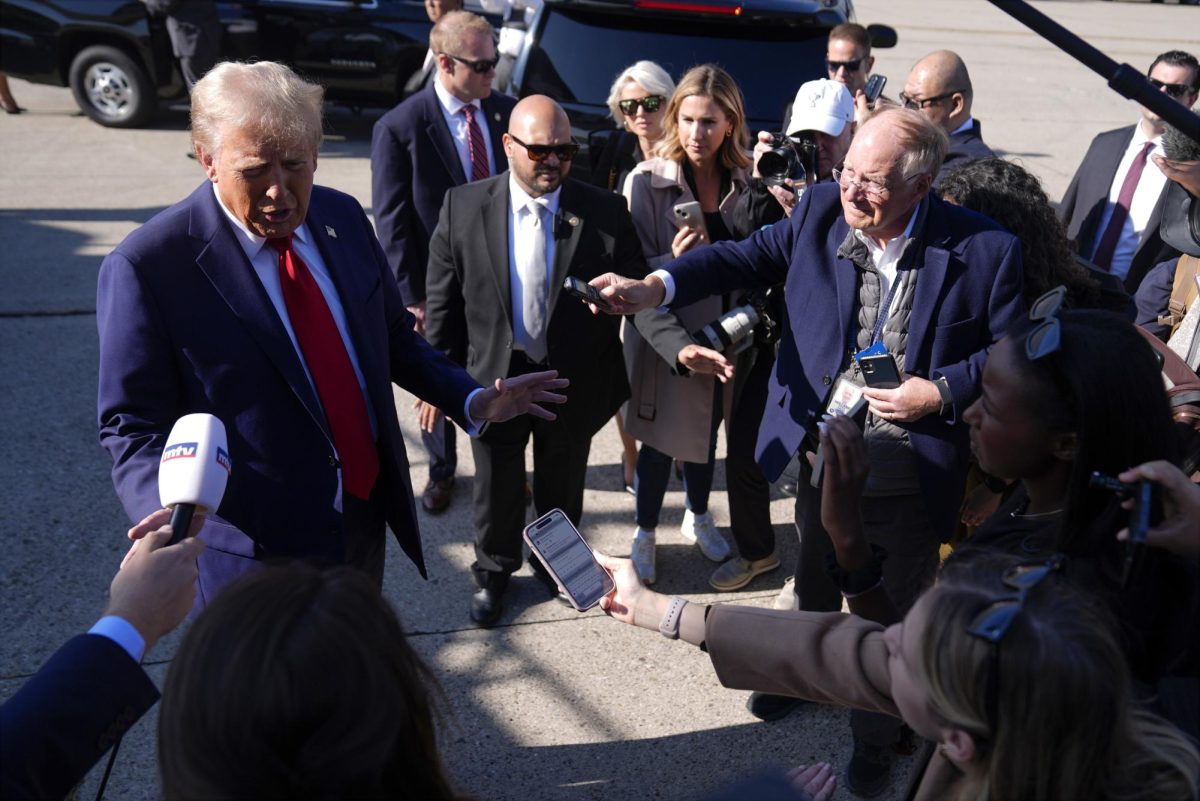The election is rapidly approaching, Harris and Trump are nearly tied in the states that will decide the next president of the United States and American politics seems to get more violent with each passing day. For lack of a better analogy, it feels like the part of a song where there are three different harmonies with the lead singer shouting the chorus and the drummer putting in the work — there’s too much to focus on, and it’s hard to pick just one thing to pinpoint.
It has become the norm in our society to observe heinous acts of political violence on the news, like death threats being sent to election workers or a shooting at a Republican congressperson’s baseball practice. While sticking our heads in the sand and blocking out all forms of media may seem enticing, political and election violence is incredibly dangerous. Its prevalence is cause for not just concern, but action as well.
This raging fire of political violence has been stoked for quite some time now, and one of the primary perpetrators is none other than Donald Trump. The former president metaphorically dumped gasoline on the dumpster fire most notably on Jan. 6, 2021, and many times since then. His overwhelming lack of response to an attempted coup thrown in his honor is a response in itself — one that makes it clear that he is not particularly bothered by political violence, so long as it is to his benefit. Since that event, the former president has repeatedly denied that he played any part in the riot, and though he originally condemned the event, he has recently called it a “day of love” — an action that has had far-reaching effects on individuals from elected officials to poll workers.
Additionally, Trump, along with his running mate JD Vance, both refuse to admit that the former president lost the 2020 election. Vance’s “damning nonanswer” at the vice presidential debate set off alarm bells that have been sounding through conversations of election integrity the past three years. The fact of the matter is that many American citizens look to their candidates for a sense of security surrounding the election — people want to know that the election is secure and that their vote is going to count, even if the outcome is not what they may have wanted. Trump and now Vance have exploited this sense of security by vehemently denying Trump lost, spurring feelings of uncertainty, fear and now acts of violence — actions that are not limited to just one political party.
Though it has primarily only been one political ideology that has failed to admit this defeat, a recent survey shows that supporting political violence is a bipartisan attitude. This support has come to fruition countless times, and violent acts against prominent political figures have plagued the news lately — Nancy Pelosi’s husband was attacked in his own home, Trump was nearly assassinated at his rally in July and a man was arrested for attempted arson after setting fire to Bernie Sanders’ office door in Vermont.
However, the threats don’t stop with elected officials — they extend to individuals who work the actual elections as well. In the years since 2021, over a dozen people have been charged by the Department of Justice for threatening election officials. These charges have contributed to the considerable attempts to ensure the safety of these workers as Election Day approaches.
Increased police presence at polling places, election directors being granted personal security and the employment of a task force to investigate threats are all examples of the measures put in place over the last few years. Many citizens, including the election officials themselves, feel greater action needs to be taken.
Attorney General Merrick Garland recently acknowledged the prevalence of election violence, a move that contributes greatly to the feelings of fear that some of these employees currently feel. Many feel as though the federal prosecution of those who threaten workers is certainly important, but it does not equate to securing and protecting the average citizens who work the election.
The effects of violence at election sites truly cannot be understated.
Currently, it appears that the election hinges upon a number of swing states, which are states where every vote will be influential in determining the outcome of the election. Should radicalized individuals take it upon themselves to commit acts of violence in their respective polling places, destroying votes or discouraging voters in the process, the election will not accurately reflect the desires of the American people. In fact, election violence threatens the very principles that our government was founded on — the concepts of voter representation that were on the founding fathers’ minds when they drafted the Declaration of Independence.
It feels as though each month within the past year has brought us into a newer, deeper pit of uncharted territory on the map of political violence. Donald Trump was nearly assassinated at one of his summer rallies, then again at a golf course and even one more time at a Coachella rally. These three instances don’t even scrape the surface of violent acts against politicians or election workers, which are countless.
Politicians must reinstill a sense of confidence in election integrity and condemn political violence on a more public scale in order to decrease the prevalence of — let alone eradicate — these horrible wrongdoings. Continued acts of violence against the government and those who run it make up the plot of every dystopian movie, and in order to preserve democracy and avoid having a real-life “Hunger Games” situation on our hands, we must call for political and election violence to become things of the past.
Tessa Powers loves to write in any style, and is passionate about social justice and media. She is always open to ideas at tep49@pitt.edu



